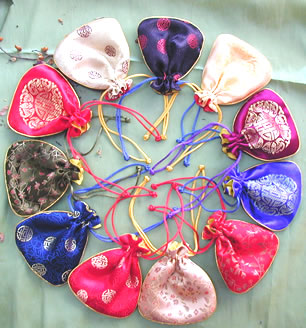
Chinese Perfume Pouch
Chinese Perfume Pouch
The history of the Chinese perfume pouch (commonly called Xiangbao, Xiangnang, Xiangdai or Hebao) can be traced back to the Duanwu Festival, or Dragon Boat Festival, which falls on the 5th day of the 5th lunar month. It is said that people in ancient times used to carry a medicine bag while hunting, to drive out poisonous insects. Today we still see some old men carry on them a bag in the shape of calabash, a custom that can probably be traced back to this old tradition.
Another old saying goes that when Qu Yuan, the great poet of the Chu state during the Warring States Period, drowned himself in Miluo River on the 5th day of the 5th lunar month, people in the neighboring Qin, out of sympathy for him and to cherish his memory, made and carried a pouch stuffed with sweet grass and perfumes that he had loved.
Some people say carrying the pouch was a long-standing custom of the Han people; its origin can be traced back to the Tang Dynasty, when women in the rural areas would in the 4th lunar month each year begin to make perfume pouch with colored silk, silk threads and gold and silver beads. By the Qing Dynasty, perfume pouch was carried by people not only on the Dragon Boat Festival, but every day, because the Manchus had long had that custom. According to the a Qing Dynasty custom, emperors and empresses were required to carry perfume pouch on them all year round and at the end of every year, or on important festivals, the emperor would award the princes and ministers each a perfume pouch to show his favor for them. More interestingly, perfume pouches were used by Emperor Tongzhi and Emperor Guangxu to choose their empresses: the girls would line up to be examined by the Emperor, who would hang a perfume pouch on the button on the dress of the girl to whom he took a fancy.
